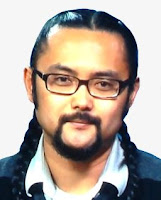The current political questions may be a test of humanity for Filipino Americans - E.J.R. David
In the current political climate, there is a strong and conceivable possibility for the United States to “suspend immigration from areas of the world" where there is a proven history of terrorism against the United States, Europe, or our allies”. Even if we use the most stringent definition for what is meant by “areas of the world” to just those considered by the U.S. State Department as “Terrorist Safe Havens,” the list of countries to be banned still number 12 - and they are Somalia, Mali, Libya, Egypt, Iraq, Lebanon, Indonesia, Malaysia, Afghanistan, Pakistan, Yemen, and the Philippines. |
| Source: Michael Vadon, commons.wikimedia.org |
Focusing on Filipinos
It may surprise many, but the country that is going to be most affected by an immigration ban against these 12 “Terrorist Safe Havens” is the Philippines. This is because out of the approximately 496,400 non-immigrant visas issued to these 12 countries in 2015, approximately 198,500 (40%) were issued to Filipinos. And out of the approximately 74,300 immigrant visas issued to these 12 countries in 2015, approximately 36,700 (50%) were issued to Filipinos.Even further, the large numbers of Filipinos coming into the U.S. is not just limited to these 2015 numbers. My sister and my two nieces were three of the thousands of Filipinos who were issued non-immigrant visas back in 2007 so they could attend my wedding. My mother was one of the thousands of Filipinos who were issued immigrant visas back in 2006 so we can finally be together after being apart from each other for half my life. My younger brother and I were two of the thousands of Filipinos who were given immigrant visas back in 1994 so we could finally live with our father after being away from him for pretty much our entire lives at that point. My father was one of the thousands of Filipinos who were given immigrant visas back in 1982 so that he could find better opportunities for his family. And my uncles, aunts, and grandfather were some of the thousands of Filipinos who were issued immigrant visas in the 1960s and 1970s.
Filipinos have been coming into the U.S. in large numbers since the passage of the 1965 Immigration Act, contributing to why Filipinos today are the second largest Asian group in the country (20% of the Asian American population), why Filipinos are the fourth largest immigrant group in the country after the Mexicans, Chinese, and Indians, and why Filipinos are the largest Asian immigrant group in 11 states including California – the most populated state in the country. Even further, Filipinos have been on these lands since 1587, long before the birth of the “U.S.A.” Also, Filipinos have been coming to these lands in large numbers since the early 1900s, when the Philippines was a U.S. colony. Thus, millions of Filipinos have long and deep roots in the U.S. already, and they have significantly contributed to this country’s rise as a global power.
Therefore, if the U.S. bans immigration “from any nation that has been compromised by terrorism,” then the millions of Filipino Americans and their relatives (in the Philippines and the rest of the diaspora) will be the most affected. Filipino families will be separated, their reunification will be delayed if not halted altogether, and those seeking better fortunes in the U.S. so they can help their families will be denied such an opportunity.
Immigration and Colonial Mentality
Nevertheless, despite these painful and unjust potential consequences, I won’t be surprised if many Filipino Americans still do not get concerned by this very conceivable ban on immigration from certain “areas of the world.” In fact, it will not be surprising if many Filipino Americans even agree with this proposed ban. We all have uncles and aunts, or titas and titos, or siblings and friends, or parents and cousins, who were already for the building of a wall along the U.S.-Mexico border, for the banning of Muslims from entering the United States, or for the deportation of immigrants – perhaps even “telling” or reporting on their fellow Filipinos who do not have papers or those who are “tago ng tago.”A big reason why it’s not surprising that many Filipinos – a largely immigrant, brown-skinned Peoples that has a long history of Islam – may be anti-immigration, anti-People of Color (including other Filipinos, especially those with darker skin), and anti-Muslim is colonial mentality. Colonialism and contemporary oppression has taught us that the United States of America is utopia, that White is right, that West is best, and that Christianization is civilization.
I have done some work on the intersections of colonial mentality and immigration before. Specifically, My brother Dr. Kevin Nadal and I conducted research showing how colonial mentality may be one of the factors that contribute to the need and desire of many Filipinos to move to the United States. Briefly, colonial mentality among Filipinos may be defined as automatically perceiving anything about the United States of America as naturally better than anything Filipino and anything about the Philippines. Therefore, the desire to “get better” by moving to the U.S. because the U.S. is automatically perceived as inherently better is one manifestation of colonial mentality.
My research has also shown, however, that colonial mentality is complex and may be expressed in various ways. Another – and perhaps more crucial – part of colonial mentality is the desire to separate one’s self from others who are perceived as inferior. This is consistent with pioneering psychologist Gordon Allport’s assertion in his classic book The Nature of Prejudice that internalized oppression – which is what colonial mentality is – involves the oppressed person becoming so much like the oppressor that the oppressed even begins to adopt the oppressors’ prejudiced attitudes.
A Test of Our Kapwa, A Test of Our Humanity
The prejudiced attitudes that may lead to separating one’s self from others is related to, but different from, the “desire to get better.” This desire to separate one’s self from others who are perceived to be inferior, undesirable, uncivilized, primitive, backward, etc. is different because while a “desire to get better” aspires to become accepted or be part of something, the desire to separate from others is the creation of walls, distinctions, levels, or hierarchies between one’s self and others. Therefore, the desire to separate from others may be seen as the damaging or loss of kapwa – the core Filipino value that one should not separate or differentiate one’s self from others – and the damaging or loss of one’s personhood, humanity, and Filipino-ness.According to distinguished Filipino psychologist Virgilio Enriquez – the founder of Sikolohiyang Pilipino or Indigenous Filipino Psychology – Kapwa is the core concept in Filipino personhood. Kapwa means fellow human being, and how we are the same, equal, and connected to our fellow human beings. Essentially, in the Filipino worldview, denying others of their humanity or dehumanizing them – separating one’s self from others because others are perceived as being “less than” – also makes one less Filipino, less of a person, or less human. It makes one "walang kapwa."
So centuries of colonialism and modern day oppression may have led to the development of colonial mentality among Filipinos. Colonial mentality may lead to the damaging or loss of kapwa, which in turn is related to how Filipinos perceive, feel about, and interact with other people.
Therefore, our kapwa test is this:
Do we regard and treat other people on the same level as us?
Do we regard and treat other people with an equal sense of humanity?
Do we regard and treat other people as our kapwa?
Or did colonialism and contemporary oppression damage us deeply enough that we have now lost our kapwa, that we have now learned to separate ourselves from others, that we have now begun to look down on others and deny them of their humanity?
Are we walang kapwa?
Having prejudiced, bigoted views is against the core Filipino value of kapwa. Having prejudiced, bigoted views makes one less human, less of a person, less of a Filipino. Having prejudiced, bigoted views is un-human; it is un-Filipino.
And I believe many people will assert that having prejudiced, bigoted views is un-American as well.
So as both Filipinos and Americans – as Filipino Americans – do we know who we are? Do we know who we are not? Do we know who we want to be?
And this is where many Filipino Americans are right now.
The political questions we are currently facing is a test of our colonial mentality, a test of our kapwa, a test of our Filipino-ness. This is a test of our humanity.
My 1st blog @HuffingtonPost just in time for 1st #PresidentialDebate: On Immigration, Colonial Mentality, & Kapwa https://t.co/yEeiSj5YA6— EJ Ramos David, PhD (@ejrdavid) September 26, 2016
About E.J.R. David, Ph.D
 E.J.R. David, Ph.D., is an associate professor of Psychology at the University of Alaska Anchorage, with his primary duties being with the Ph.D. Program in Clinical-Community Psychology that has a rural, cultural, and indigenous emphasis. Dr. David was the 2007 recipient of the American Psychological Association (APA) Society for the Psychological Study of Ethnic Minority Issues (Division 45) Distinguished Student Research Award "for his significant contribution in psychological research related to ethnic minority populations." In 2012, Dr. David was honored by the APA Minority Fellowship Program (MFP) with the Early Career Award in Research for Distinguished Contributions to the Field of Racial and Ethnic Minority Psychology, citing his "outstanding scientific contributions and the application of this knowledge toward the improved mental and physical well-being of people of color." In 2013, he was also chosen to receive the Asian American Psychological Association Early Career Award for Distinguished Contributions to Research. He is the author of Brown Skin, White Minds: Filipino-American Postcolonial Psychology, as well as Internalized Oppression: The Psychology of Marginalized Groups, which highlights the universality of internalized oppression and, at the same time, acknowledges its unique manifestations and implications for various groups such as African-Americans, Latinas/os, Asian-Americans, Pacific Islanders, American Indians, Alaska Natives, women, the LGBT community, and people with disabilities.
E.J.R. David, Ph.D., is an associate professor of Psychology at the University of Alaska Anchorage, with his primary duties being with the Ph.D. Program in Clinical-Community Psychology that has a rural, cultural, and indigenous emphasis. Dr. David was the 2007 recipient of the American Psychological Association (APA) Society for the Psychological Study of Ethnic Minority Issues (Division 45) Distinguished Student Research Award "for his significant contribution in psychological research related to ethnic minority populations." In 2012, Dr. David was honored by the APA Minority Fellowship Program (MFP) with the Early Career Award in Research for Distinguished Contributions to the Field of Racial and Ethnic Minority Psychology, citing his "outstanding scientific contributions and the application of this knowledge toward the improved mental and physical well-being of people of color." In 2013, he was also chosen to receive the Asian American Psychological Association Early Career Award for Distinguished Contributions to Research. He is the author of Brown Skin, White Minds: Filipino-American Postcolonial Psychology, as well as Internalized Oppression: The Psychology of Marginalized Groups, which highlights the universality of internalized oppression and, at the same time, acknowledges its unique manifestations and implications for various groups such as African-Americans, Latinas/os, Asian-Americans, Pacific Islanders, American Indians, Alaska Natives, women, the LGBT community, and people with disabilities.Dr. David was born in the Philippines by Kapampangan parents, and he grew up in Pasay, Las Pinas, Makati, and Barrow, Alaska.
Follow the author on Twitter.
More information about the author here.
This was reposted from PsychologyToday.com with E.J.R. David's permission.







0 Comments